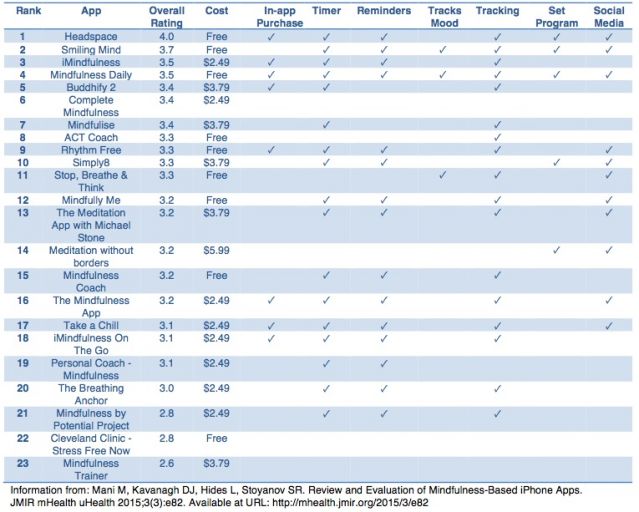Mindfulness
What Mindfulness App Is Right for You?
New study reveals top 4 mindfulness apps. Which one best fits your personality?
Posted August 22, 2015

How do you figure out which mindfulness app is right for you? There are over 500 mindfulness apps available. But now, it'll be a little bit easier to find one that works for you.
A new study published in the Journal of Medical Internet Research sorted through hundreds of mindfulness mobile apps and ranked 23 of them.
Mindfulness based programs delivered in person have been found to be effective for reducing stress, anxiety, and depression. Jon Kabat-Zinn, the creator of the structured 8-week course Mindfulness-Based Stress Reduction (MBSR), defines mindfulness as “paying attention on purpose, in the present moment, and non-judgmentally to the unfolding of experience moment by moment.”
However, it’s unclear if you can reap the same benefits of mindfulness programs with mobile apps. There is only one scientific study on the effectiveness of a mindfulness app (Headspace app). Users who tried the Headspace app for 10 days showed improvement in mood and fewer symptoms of depression.
We rely on our smartphones more and more (25% of page views currently come from mobile devices), so it helps to figure out what apps are right for us. The new study ranks 23 mindfulness mobile apps using a standardized tool designed for mobile health apps called the Mobile Application Rating Scale (MARS), which rates aspects like ease of use, look, and overall satisfaction.
Here are the top 4 mindfulness apps based on the study (ratings out of 5 = excellent):
- Headspace (Overall Rating 4.0)
- Smiling Mind (Overall Rating 3.7)
- iMindfulness (Overall Rating 3.5)
- Mindfulness Daily (Overall Rating 3.5)
The lowest rated app was Mindfulness Trainer (Overall Rating 2.6). Check out the table below to find what features each app has to see what will work best for you.

What did the apps include?
Most of the apps included breathing exercises and body scans. Here’s a sampling of the types of exercises in the apps:
- Breath awareness: Bring attention to each breath
- Body scan: Bring attention to body parts, from the toes and up towards the head
- Sitting meditation: Meditate in a seated posture
- Walking meditation: Walk with attention and careful pacing
- Loving kindness (Metta) meditation: Send love and kindness to oneself and others
- Passing thoughts and emotions: Notice and let go thoughts and feelings
- Mountain meditation: Imagine yourself as a mountain
- Lake meditation: Imagine yourself as a lake
- Three-minute breathing: Be aware (1 minute), focus attention (1 minute), and grow attention (1 minute)
Most of the apps had two or more of these exercises.
What app features best fit your personality?
Likes to Level Up. If you’re someone who likes to complete levels and move on, then consider apps with step-by-step programs:
- Headspace (Free 10 day program with 10 minute guided meditations)
- Smiling Mind (10 weeks based on age group)
- Mindfulness Daily (21 day mindfulness exercises)
- Simply8 (3 weeks with 8 guided meditation with weekly themes)
- Meditation without Borders (4 weeks with guided meditation 20 minutes daily)
Loves Social Media. If being connected to social media motivates you, try apps that allow you to share your experience on Facebook and Twitter: Headspace, Meditacious, Meditation without Borders, Mindfully Me, Mindfulness Daily, Rhythm Free, Simply8, Smiling Mind, Stop, Breathe & Think, Take A Chill, The Meditation App with Michael Stone, and The Mindfulness App.
Reader. If you’re someone that likes to learn information by reading, try ACT Coach or Complete Mindfulness. Both contain detailed in-app texts on mindfulness.
Visual Learner. If you prefer not to read as much, try Headspace, which delivers information about mindfulness in the form of videos and infographics.
In Touch With Emotions. If you like to track how you’re feeling, these three mindfulness apps include ways to track your mood: Smiling Mind, Mindfulness Daily, and Stop, Breathe and Think.
Changing it up for the occasion. If you like exercises meant specifically when you're at the gym, sleeping, or on work breaks, try Buddhify 2 or Meditation Oasis (an app which was not reviewed in the study). They offer guided meditations and exercises based on your situation.
Designer with a good eye. If you’re sensitive to aesthetics, try Headspace or Smiling Mind. These two apps ranked highest in the aesthetics category.
Beginner. For those new to mindfulness, start with the top 4 apps from the recent study. And don't give up if the first app you download doesn’t seem to work. You might need a different voice or program that works for you.
Every app uses different voices, interface, and types of guided meditation, so try a variety of apps to see what sticks. At the end of the day, the most important thing is that you feel drawn back to practicing everyday.
Connect with Dr. Wei on marlynnweimd.com/ Facebook / Twitter / Yoga Health
Dr. Wei is the upcoming co-author of The Harvard Medical School Guide to Yoga
Copyright © 2015 Marlynn Wei, MD, PLLC




